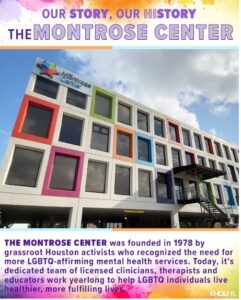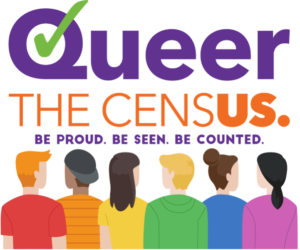Increasing 2020 Census Participation by Hard-to-Reach LGBTQ+ Communities
Some of us don’t give a second thought to filling out a U.S. Census Bureau survey every 10 years. We consider it civic responsibility at best and a minor nuisance at worst. For members of the LGBTQ+ community, however, participation in the census is not so straightforward.
Having endured a long and painful history of government-backed discrimination and criminalization, many LGBTQ+ people are understandably wary of census participation because of the potential for government abuse and misuse of their personal information. Low participation results in an overall undercount of the community, which in turn results in underfunding of governmental services. These services are those that historically excluded groups, such as the LGBTQ+ community, urgently need access to.
Inside this story:
- In 2019, the Hogg Foundation awarded $2.1 million in grant funds to 28 organizations for its Texas Communities Count initiative. The goal was to support complete count efforts in Texas for the 2020 U.S. Census, focusing on traditionally hard-to-count (HTC) populations, communities and geographic areas throughout the state.
- The Montrose Center of Houston, an LGBTQ+ community and resource center, received $74,799 to support its Queer the Census campaign.
- Thirteen Houston based advocacy organizations collaborated with the Montrose Center’s outreach campaign with the goal of increasing census participation among traditionally undercounted members of the LGBTQ+ community.
- The Queer the Census campaign reached 76,000 individuals through in-person and virtual outreach, social media engagements, email, phone banking, and print and digital marketing.
- The success of the campaign increased the Montrose Center’s capacity for future large-scale advocacy projects and strengthened relationships among Houston LGBTQ+ advocacy organizations, establishing opportunities for ongoing networking and cooperation.
Montrose Center
 In 2019, the Hogg Foundation created the Texas Communities Count (TCC) initiative. A total of $2.1 million went to 28 organizations across Texas, including the Montrose Center of Houston. The goal of the initiative was to encourage participation in the 2020 census by traditionally hard-to-reach and undercounted populations.
In 2019, the Hogg Foundation created the Texas Communities Count (TCC) initiative. A total of $2.1 million went to 28 organizations across Texas, including the Montrose Center of Houston. The goal of the initiative was to encourage participation in the 2020 census by traditionally hard-to-reach and undercounted populations.
The Montrose Center has served as a hub for the city’s LGBTQ+ community since 1978. The Center provides physical and mental health services; sponsors wellness groups and activities; hosts community events; and provides meeting space for other civic organizations. Fostering civic participation is also a key priority of the Center, having long understood that advocacy and engagement are key to empowering the LGBTQ+ community.
dollars granted to 28 organizations for the Texas Community Count initiative to support complete count efforts in Texas for the 2020 U.S. Census.
Queer the Census – An LGBTQ+ Civic Engagement Collaborative
The Center used their TCC grant award to develop the Queer the Census campaign and to lead collaborative outreach efforts focusing on the LGBTQ+ community in the greater Houston area.
“We knew that historically there has been confusion in the transgender community about what the census was asking regarding gender,” says Kennedy ‘Kent’ Loftin, chief development officer at the Montrose Center. “That confusion, and many other misconceptions, often meant our community was being underrepresented in the census and we wanted to change that.”
Queer the Census was part of a nation-wide effort by LGBTQ+ organizations to have the community be counted in the 2020 Census.
Collaboration among Houston’s many LGBTQ+ advocacy organizations was central to the campaign. Pooling resources with members of the LGBTQ+ Civic Engagement Collaborative (LGBTQ-CEC), including the National LGBTQ Task Force, Houston in Action, Houston’s Census liaisons (U.S. Census Bureau’s LGBTQ Liaison Office), the Lesbian Health Initiative, Greater Houston LGBT Chamber of Commerce, Houston LGBTQ+ Political Caucus, PRIDE Houston, Transform Houston, Transgender Education Network of Texas, and Equality Texas greatly increased the impact of the Queer the Census campaign.
“Because it was so collaborative, our messaging reached the breadth of Houston’s LGBTQ+ community,” says Kent.
“We knew that historically there has been confusion in the transgender community about what the census was asking regarding gender. That confusion, and many other misconceptions, often meant our community was being underrepresented in the census and we wanted to change that.”
Facing Challenges
Generating public interest in the campaign faced wasn’t easy, though.
“The census isn’t sexy,” says Kent. “Creating interest in the census – and ensuring our community knows why it’s important will always be a difficult sell.”
And of course, there was COVID-19. When the pandemic hit, participating organizations had to refocus their energy on more urgent pandemic-related client care. The campaign had no choice but to move from community activities to virtual events and to increase its reliance on email and phone banking operations. Although these unexpected changes reduced their overall reach, they didn’t put an end to the campaign.
“One-on-one messaging formats enabled us to continue to provide important information to community members,” says Kent. “Through phone calls with community members [we could still] help guide them in filling out their forms and answering important questions, like who should be counted in a household and how housing insecure community members should report and be counted.”
Campaign Outcomes
Despite these challenges, the Queer the Census campaign made considerable progress toward increasing participation in the 2020 census. The collaborative trained more than 230 individuals to speak about the census, address concerns, and communicate its relevance to the LGBTQ+ community. This messaging reached 76,000 individuals through a combination of special events, virtual outreach, social media engagements, email, phone banking, and marketing materials.
Perhaps the most meaningful outcome of the project was its collaborative nature.
individuals received messaging encouraging census participation through special events, virtual outreach, social media engagements, email, phone banking, and marketing materials.
“This experience was a solid start to future networking opportunities and helped establish greater strength between LGBTQ+ organizations in Houston,” says Kent. “It continues to help ensure that important events and information affecting the community engage the broadest possible audience.”
Moving Forward
 The success of the Queer the Census campaign has built the Montrose Center’s capacity for future advocacy projects and positioned the LGBTQ-CEC for ongoing collaborative work.
The success of the Queer the Census campaign has built the Montrose Center’s capacity for future advocacy projects and positioned the LGBTQ-CEC for ongoing collaborative work.
“Queer the Census was our first major LGBTQ+ advocacy push,” says Kent. “Because of its success, we’re launching an advocacy program in the coming year that will give voice to the negative mental and behavioral outcomes that certain policies create.”
The LGBTQ-CEC has continued to work together through drive-thru voter registration drives, dissemination of LGBTQ COVID-19 resources, and the coordination of funeral services for a local transgender activist and icon.
The Queer the Census campaign’s impact goes far beyond the 2020 census. The project helped the Montrose Center empower community members to live fuller, healthier lives by ensuring they are seen, heard, and counted.

